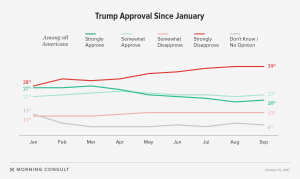The following article by Ruy Teixeira, author of The Optimistic Leftist: Why the 21st Century Will Be Better Than You Think and other works of political analysis, is cross-posted from his blog:
Do people in small town, exurban and rural America really have anything to complain about or are they just lashing out because of the rise of diversity? A fascinating column by Ron Brownstein covers the diverging fate of these places and the faster growing cores of metropolitan areas. It would appear that folks in these areas really do have something to complain about and that they really are, in fact, being left behind.
In metro areas from Seattle to Chicago to Washington, DC, new data show that per capita incomes, education levels and the young adult share of the population are rising rapidly in downtown urban centers that were left for dead 30 and 40 years ago. Simultaneously…incomes, education levels and the age structure is failing to keep pace, or even deteriorating, in the small town and exurban communities at the metropolitan area’s periphery.
This widening geographic separation between town and country — reinforced by a strong urban tilt in such key measures as venture capital investment and new business formation — helps explain President Donald Trump’s overwhelming support in the smaller, mostly white communities that largely feel excluded from the economic recovery since 2009….. per capita incomes since 1990 have increased just three percent in communities 30 miles out, while rising fully 45% at the city center.
Like a river cutting through rock, these shifting economic currents are helping to carve the nation’s stark new political alignment. Along with unease about demographic and cultural changes, the sense of falling behind economically helps explain Trump’s dominance of mid-sized and small town America: he carried more than 2,600 counties last fall, more than any candidate in either party since Ronald Reagan in 1984.
Conversely, the thriving economies, and increasingly youthful and well-educated profiles of the largest urban centers, help explain how Hillary Clinton carried 87 of the 100 largest counties by a combined margin of nearly 14.7 million votes, according to calculations by Pew Research Center senior writer Drew DeSilver (including Washington, DC, pushes the margin to nearly 15 million votes). Although few Democrats recognize it in their rhetoric or agenda, they are increasingly the party of the places in America that are succeeding the most in the globalized, post-industrial economy.
The moral of the story: if Democrats want to succeed with the voters they’ve been losing, they will have to make a very serious effort to spread economic opportunity more widely.





